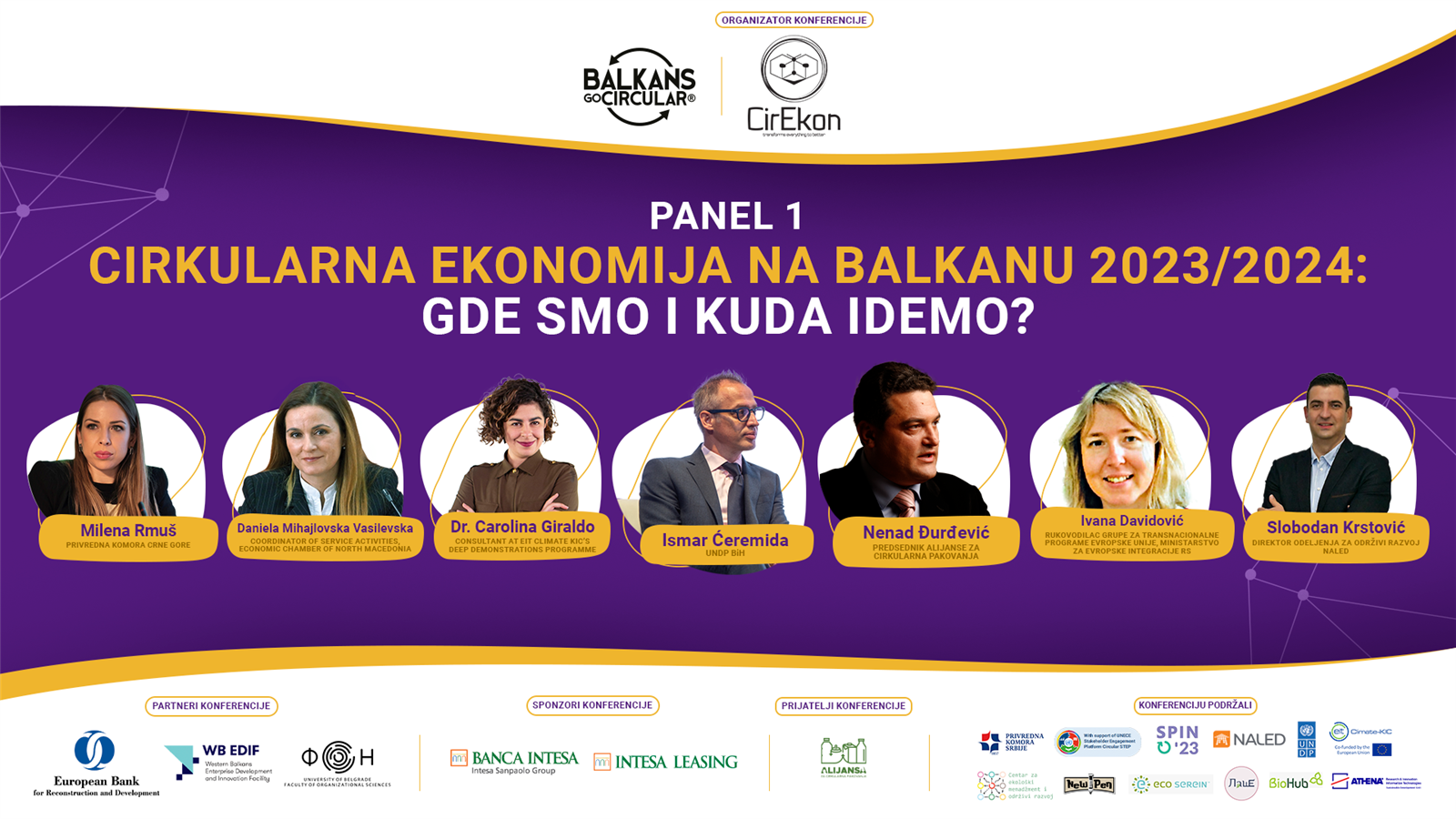„Dimitrie Cupovski“ 13, 1000 Skopje +38923244000 ic@mchamber.mk
„Dimitrie Cupovski“ 13, 1000 Skopje +38923244000 ic@mchamber.mk

Under the motto "Balkans Go Circular 2023," the Faculty of Social Sciences (FON) organized the third conference on circular economy, where the Economic Chamber took part in the first panel discussion: "Circular Economy in the Balkans 2023/2024: Where Are We and Where Are We Going?"
The panel aimed to answer the following questions at a regional level through discussion:
.jpg)
Representing the Chamber, Daniela Mihajlovska-Vasilevska spoke on three main topics where the circular economy is already being addressed in Macedonia, despite the country not yet having a strategy for a circular economy.
Macedonia is entirely focused on following EU’s environmental legislation. In the Ministry of Environment, laws from the waste sector, the Law on Climate Action, the Law on Energy Efficiency, the Law on Energy, and the Energy Strategy have been adopted and are in operation, fully aligned with EU directives and legislation. Following the circular economy concept, guided by the principles of waste laws, climate action, and the use of renewable energy production models, many activities are continuously implemented at various levels (central and local) in line with the defined legal framework to activate the business sector and citizens, raising awareness and application of environmental protection, recycling, and the importance of waste management through the reduction of harmful gas emissions that pollute the environment and directly contribute to global warming.
2. Current Activities in the Field of Circular Economy in Macedonia and the Chamber's Role in the Process
Activities are carried out in several directions:
First, by treating special waste streams according to the laws (packaging waste, electronic and electrical waste, battery, and car battery waste). The same monitoring model will be applied to new forms of specific waste types (oils, tires, textiles, and automobiles) starting 1 January next year.
Macedonia has a model of informal handlers of packaging waste involving around 2,500-3,000 people, 84% of whom are Roma, of varying ages, most being around 40 years old. These are socially vulnerable groups forced into this activity by poverty. A survey conducted in the country showed that they are an important segment of public hygiene and currently significantly degrade the image of hygiene in municipalities, especially around dumpsters. Therefore, it is crucial to integrate them into the system. The disappointing fact is that only 5% of the waste they collect is recycled. Hence, integrating informal packaging waste collectors into a formal system would benefit everyone.
Second, monitoring the EU regulation on establishing the Carbon Border Adjustment Mechanism (CBAM). On 18 December, we are organizing the second event in the Chamber to inform steel and iron producers on preparing their annual reports to meet their EU partners' needs.
It is important to emphasize that achieving zero emissions requires serious transformations in every branch of industry, investment in increasing efficiency in energy use and input materials, investing in energy-efficient technologies, and green energy. All of this will increase the final cost of products. Considering the need for decarbonization, in recent years, we have witnessed a growing number of initiatives by both states and industries and the formation of various types of partnerships supporting this transformation process.
Third, mapping various types of waste in key sectors for their treatment in the circular economy process, an ongoing effort by the Ministry of Economy in Macedonia. To this end, a constructive dialogue involving all stakeholders has pinpointed the sectors: construction, biogas plants, circular business models for SMEs, textiles, general waste, and metallurgy. This activity leads to a draft strategy for developing the circular economy from 2024. However, it is important to emphasize that no sector should be excluded from the circular economy process, and in the coming period, appropriate activities should be developed according to the priority list in each sector.
3. How the Chamber Monitors the Circular Economy Process with its Structure
The Economic Chamber of Macedonia recognizes the need for a systematic and coordinated monitoring of activities related to the circular economy and environmental protection as one of the key activities to which businesses must pay special attention in the future. To this end, we are creating a Circular Economy Center within the Chamber, which focuses on three aspects.
The panel moderator was Siniša Mitrović, Head of the Circular Economy Department at the Chamber of Commerce and Industry of Serbia, and the panelists included Milena Rmus from the Chamber of Economy of Montenegro, Ismar Ćeremida, a representative from UNDP Bosnia and Herzegovina, Nenad Đurđević, a representative of the Alliance for Circular Packaging, and Carolina Giraldo Nohra from EIT Climate-KIC (Knowledge and Innovation Community), which works on accelerating the transition to a zero-carbon, climate-resilient society. The organization is supported by the European Institute of Innovation & Technology (EIT), which identifies and supports innovations that help society mitigate and adapt to climate change.